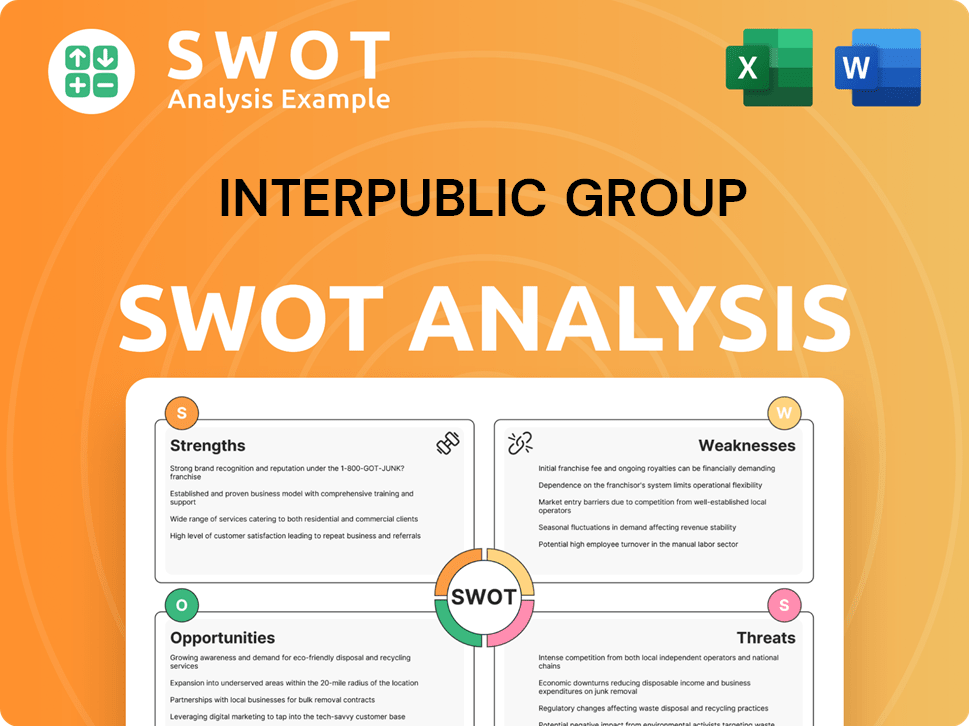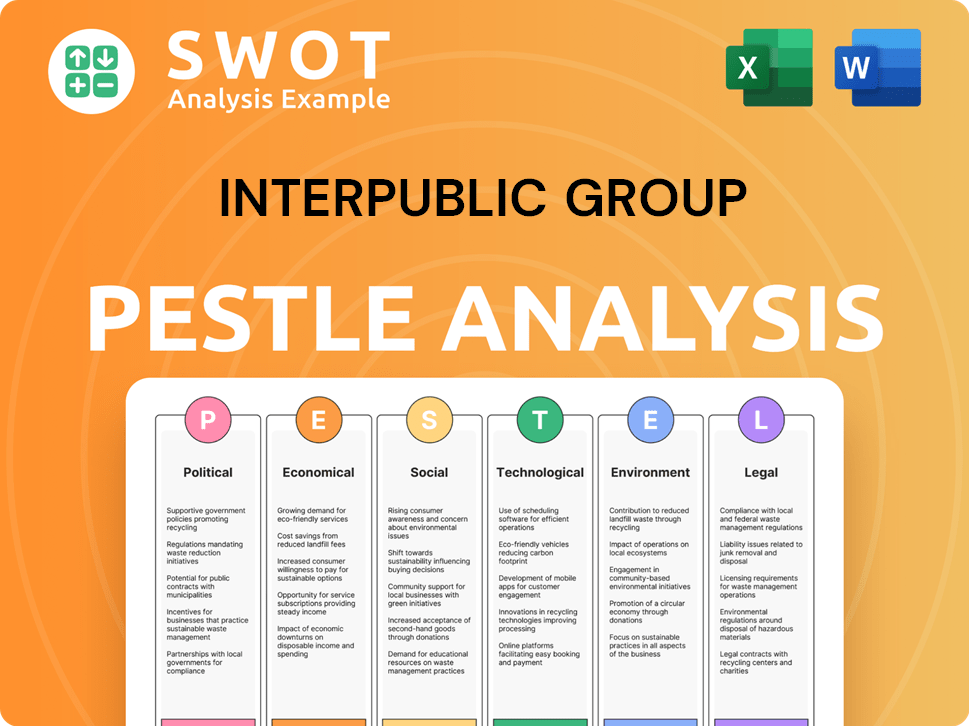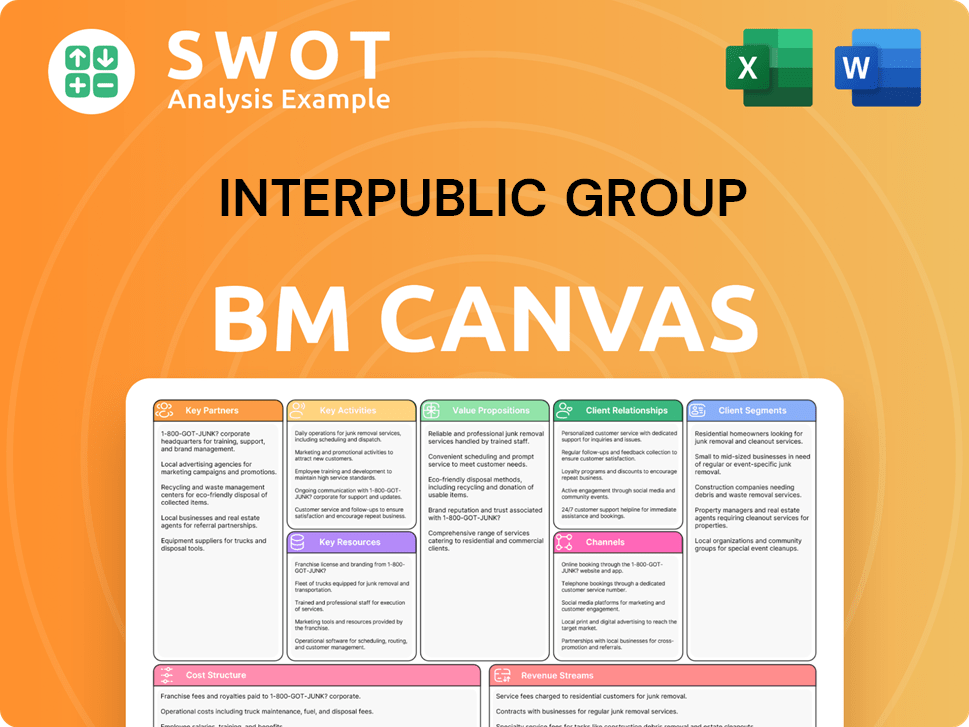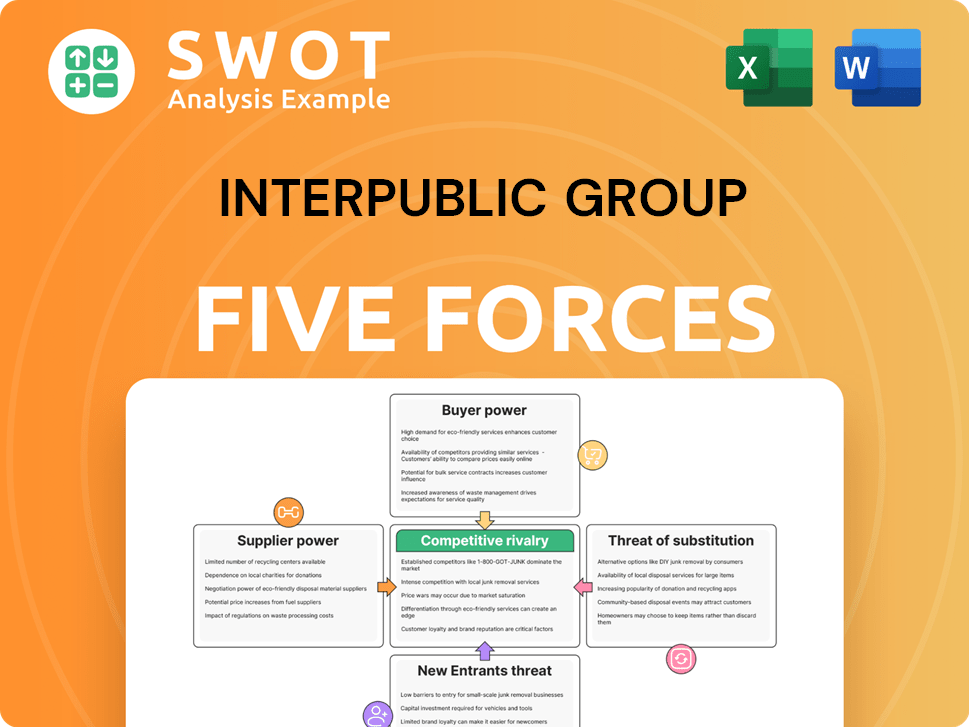Interpublic Group Bundle
Who Really Controls Interpublic Group?
Unraveling the intricate web of Interpublic Group SWOT Analysis and its ownership is key to grasping its strategic moves and market dominance. From its roots as McCann-Erickson to its current status as a global advertising powerhouse, IPG's journey has been shaped by its ownership structure. Understanding who owns IPG sheds light on its financial performance, strategic direction, and ability to navigate the ever-evolving marketing landscape. This exploration will uncover the key players influencing this advertising giant.

The composition of IPG ownership, including its major shareholders and the influence of institutional investors, significantly impacts its operational decisions. As a publicly traded entity, understanding the dynamics of Interpublic Group stock and its shareholder base is crucial for anyone interested in the company's future. This analysis will provide insights into the forces shaping IPG's trajectory, from its market capitalization to its response to industry trends, giving you a comprehensive view of this leading advertising holding company and answering questions like "Who is the CEO of Interpublic Group?" and "How to buy IPG stock?".
Who Founded Interpublic Group?
The story of Interpublic Group (IPG) begins with the founding of McCann-Erickson Inc. in 1930. While H.K. McCann is closely associated with its start, the early ownership structure of advertising agencies often included key executives and partners. The precise equity split among founders at the beginning isn't readily available in public records from that time.
The formation of Interpublic Group as a holding company in 1961 marked a significant shift. This strategic move consolidated various agencies under one umbrella. This allowed its agencies to operate independently while benefiting from the resources and scale of a larger entity. Early backers were primarily internal stakeholders and potentially financial institutions that supported its growth.
The vision was to create a diversified marketing services organization, reflecting the evolving needs of clients in a rapidly changing media landscape. This strategic approach helped shape the future of IPG and its position in the market.
Initial ownership agreements focused on integrating acquired agencies while maintaining their identities. This likely involved share exchanges for the acquired agencies' owners. They became shareholders in the newly formed Interpublic Group.
Early ownership disputes or buyouts were part of the consolidation process. Different agency cultures and leadership teams merged. The distribution of control was influenced by the size and profitability of the agencies brought into IPG.
Key executives from larger, more successful agencies likely held significant influence and equity stakes. This shaped the direction and strategic decisions within the newly formed IPG.
The strategic vision was to build a diversified marketing services organization. This reflected the evolving needs of clients in a rapidly changing media landscape. This approach helped IPG adapt and grow.
IPG's structure allowed it to adapt to market changes. It provided resources and scale to its agencies. This strategic move helped IPG maintain a strong position in the market.
Early backers included internal stakeholders and financial institutions. This supported IPG's growth and expansion strategy. This approach helped IPG become a major player in the advertising industry.
Understanding the evolution of IPG ownership and IPG shareholders provides insight into the company's development. For those interested in the company's history, a Brief History of Interpublic Group offers additional context. As of Q1 2024, the company's financial performance shows continued growth, with a focus on digital transformation and expanding its global footprint. The IPG company continues to adapt to the changing market dynamics, with its subsidiaries playing a key role in its overall strategy. Investors often follow the Interpublic Group stock performance closely, and information on Interpublic Group investor relations is readily available for those seeking to understand the company's current position.
Interpublic Group SWOT Analysis
- Complete SWOT Breakdown
- Fully Customizable
- Editable in Excel & Word
- Professional Formatting
- Investor-Ready Format

How Has Interpublic Group’s Ownership Changed Over Time?
The evolution of ownership in Interpublic Group (IPG) has been marked by its transition to a publicly traded entity. Listed on the New York Stock Exchange (NYSE) under the ticker 'IPG,' the company's ownership is dispersed among a variety of stakeholders, including institutional investors, mutual funds, and individual shareholders. This structure reflects the typical ownership model of a mature, publicly listed corporation. The company's journey, from its founding to its current status, has seen significant shifts in its ownership landscape, influenced by strategic acquisitions and market dynamics. If you want to know more about the company, you can read about Revenue Streams & Business Model of Interpublic Group.
Key events have shaped IPG's ownership structure. The acquisition of Acxiom's Marketing Solutions business in 2018 for $2.3 billion enhanced its data capabilities, potentially attracting new investors. These strategic moves, including acquisitions and divestitures, have aimed to strengthen IPG's competitive position and adapt to the changing digital marketing environment. These changes have generally aimed to enhance IPG's competitive position and adapt to the evolving digital marketing landscape. The influence of major institutional shareholders is primarily through their voting power on corporate governance matters, including board elections and executive compensation.
| Shareholder | Percentage of Shares (as of Dec 31, 2023) | Notes |
|---|---|---|
| The Vanguard Group Inc. | 11.7% | A major institutional investor. |
| BlackRock Inc. | 10.9% | Another significant institutional holder. |
| State Street Corporation | 5.0% | Holds a substantial stake. |
As of April 2025, the major institutional investors hold considerable stakes in Interpublic Group. These include prominent asset management firms and investment funds. The Vanguard Group Inc. held 11.7% of the outstanding shares as of December 31, 2023, while BlackRock Inc. held 10.9%, and State Street Corporation held 5.0%. Other significant holders include Capital Research Global Investors, J.P. Morgan Investment Management Inc., and Geode Capital Management, LLC. These institutional holdings often represent passive investments in index funds or actively managed portfolios seeking exposure to the advertising and marketing sector. This structure reflects a broad base of ownership, typical of a mature, publicly traded company.
Understanding IPG's ownership structure is key for investors and stakeholders. The company's ownership is primarily held by institutional investors, indicating a stable and mature financial profile. Key institutional holders include The Vanguard Group, BlackRock, and State Street Corporation.
- IPG is a publicly traded company listed on the NYSE.
- Major shareholders influence corporate governance.
- Acquisitions have shaped the company's structure.
- Institutional investors play a vital role.
Interpublic Group PESTLE Analysis
- Covers All 6 PESTLE Categories
- No Research Needed – Save Hours of Work
- Built by Experts, Trusted by Consultants
- Instant Download, Ready to Use
- 100% Editable, Fully Customizable

Who Sits on Interpublic Group’s Board?
The current Board of Directors of Interpublic Group (IPG) is pivotal in guiding the company's governance and strategic direction. As of April 2025, the board is composed of a blend of independent directors and executive leadership, ensuring a balance of perspectives. For example, Philippe Krakowsky, the Chief Executive Officer, is a member of the board. Other board members typically come from diverse backgrounds, bringing expertise in areas like finance, technology, and global business. This structure supports fiduciary responsibility and aligns with shareholder value. Understanding the Competitors Landscape of Interpublic Group can provide additional context to the board's strategic challenges.
The board's composition and decisions are regularly reviewed by proxy advisory firms and institutional investors, influencing their voting recommendations. The board's structure reflects a commitment to balancing the interests of a broad shareholder base. While specific individuals representing major shareholders like Vanguard or BlackRock may not directly sit on the board, the overall composition is designed to ensure effective oversight and strategic alignment.
| Board Member | Title | Affiliation |
|---|---|---|
| Philippe Krakowsky | Chief Executive Officer | Interpublic Group |
| Michael I. Roth | Chairman of the Board | Interpublic Group |
| Ellen T. Alemany | Independent Director | CIT Group Inc. |
Interpublic Group operates under a one-share-one-vote structure. This means that each share of common stock generally entitles its holder to one vote on shareholder matters. There are no indications of dual-class shares or other arrangements that would grant disproportionate voting power. This standard voting structure ensures that the collective interests of all shareholders, particularly large institutional investors, are reflected in corporate decisions.
The Board of Directors at Interpublic Group oversees the company's strategic direction and governance. The board includes a mix of independent directors and executive leadership. IPG operates on a one-share-one-vote system, ensuring fair representation for all shareholders.
- The board includes both executive and independent directors.
- One-share-one-vote structure is in place.
- The board is responsible for fiduciary duties.
- Shareholders' interests are a priority.
Interpublic Group Business Model Canvas
- Complete 9-Block Business Model Canvas
- Effortlessly Communicate Your Business Strategy
- Investor-Ready BMC Format
- 100% Editable and Customizable
- Clear and Structured Layout

What Recent Changes Have Shaped Interpublic Group’s Ownership Landscape?
Over the past few years (2022-2025), the ownership of Interpublic Group (IPG) has largely mirrored broader industry trends, with institutional investors playing an increasingly significant role. While there haven't been major shifts in the fundamental ownership structure, the company has actively managed its capital and adapted to market dynamics. For example, IPG has engaged in share repurchase programs; in 2023, the company returned approximately $1.1 billion to shareholders through dividends and share repurchases, according to company reports.
Industry trends, such as the growth of passive investing, have led to increased institutional ownership by index funds. This can promote stability, but it may also result in less active engagement from some large shareholders compared to traditional active managers. The advertising industry has also seen ongoing consolidation, with larger holding companies like IPG acquiring specialized agencies to enhance their capabilities. These acquisitions, while not directly altering IPG's overall ownership structure, can influence shareholder value through the issuance of new shares or debt.
| Metric | Value | Year |
|---|---|---|
| Share Repurchases | $1.1 billion | 2023 |
| Market Capitalization | Approximately $10.5 billion | Early 2024 |
| Institutional Ownership | Around 80% | Estimated, based on recent filings |
Looking ahead, IPG's focus remains on strategic growth initiatives, digital transformation, and financial performance. The company aims to sustain its competitive edge and attract investor interest through organic growth and strategic acquisitions, rather than fundamental changes to its ownership model. To understand the target market of Interpublic Group and its business model, you can explore the information provided in this article: Target Market of Interpublic Group.
Institutional investors are increasingly influential in IPG's ownership. Share repurchase programs have been a key financial activity. The company focuses on delivering shareholder value through growth and acquisitions.
IPG has returned approximately $1.1 billion to shareholders in 2023 through dividends and share repurchases. The company's market capitalization is approximately $10.5 billion. Institutional ownership is estimated to be around 80%.
IPG is focused on strategic growth, digital transformation, and financial performance. There are no immediate plans for privatization or major ownership changes. The company aims to sustain its competitive edge through organic growth and acquisitions.
The rise of passive investing has increased institutional ownership. Ongoing consolidation in the advertising industry impacts IPG. IPG is adapting to a dynamic market through AI and data investments.
Interpublic Group Porter's Five Forces Analysis
- Covers All 5 Competitive Forces in Detail
- Structured for Consultants, Students, and Founders
- 100% Editable in Microsoft Word & Excel
- Instant Digital Download – Use Immediately
- Compatible with Mac & PC – Fully Unlocked

Related Blogs
- What are Mission Vision & Core Values of Interpublic Group Company?
- What is Competitive Landscape of Interpublic Group Company?
- What is Growth Strategy and Future Prospects of Interpublic Group Company?
- How Does Interpublic Group Company Work?
- What is Sales and Marketing Strategy of Interpublic Group Company?
- What is Brief History of Interpublic Group Company?
- What is Customer Demographics and Target Market of Interpublic Group Company?
Disclaimer
All information, articles, and product details provided on this website are for general informational and educational purposes only. We do not claim any ownership over, nor do we intend to infringe upon, any trademarks, copyrights, logos, brand names, or other intellectual property mentioned or depicted on this site. Such intellectual property remains the property of its respective owners, and any references here are made solely for identification or informational purposes, without implying any affiliation, endorsement, or partnership.
We make no representations or warranties, express or implied, regarding the accuracy, completeness, or suitability of any content or products presented. Nothing on this website should be construed as legal, tax, investment, financial, medical, or other professional advice. In addition, no part of this site—including articles or product references—constitutes a solicitation, recommendation, endorsement, advertisement, or offer to buy or sell any securities, franchises, or other financial instruments, particularly in jurisdictions where such activity would be unlawful.
All content is of a general nature and may not address the specific circumstances of any individual or entity. It is not a substitute for professional advice or services. Any actions you take based on the information provided here are strictly at your own risk. You accept full responsibility for any decisions or outcomes arising from your use of this website and agree to release us from any liability in connection with your use of, or reliance upon, the content or products found herein.